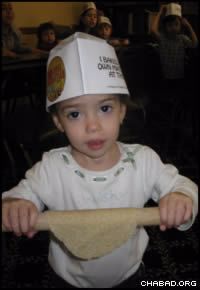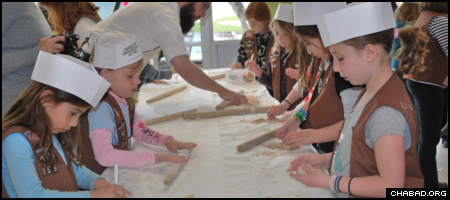Jewish centers around the world took a hands-on approach to prepping people for Passover, offering children and adults alike the chance to get down and dirty with flour and water and learn how to make the special unleavened bread known as matzah.
The “model matzah bakery,” as such programs are known, is a powerful way for people to connect with the holiday – it begins this year on March 29 – says Chabad-Lubavitch Rabbi Shmuel Posner, a veteran whom Boston locals occasionally stop in the supermarket, referring to him as “the matzah guy.” What makes the experience so unique, he explains, is that through it, participants become a part of Passover.
“Everything that kids know about Judaism is disconnected from them,” says Posner, director at a Boston Chabad House. “Kids come to synagogue and they see a Torah scroll, but they’ve never picked up a quill and written on the parchment.
“Here, they’re actually touching the wheat, grinding it, making it into dough,” he continues. “So we tell them, that at their family’s Seder, they can get up on the chair and tell everyone that they know how the matzah is made, because they actually made some.”
The Chabad House of Greater Boston has hosted its matzah baking event annually for the past 20 years. This year, it had upwards of 500 children, representing the full spectrum of Jewish life, attending a week-long bakery held at a nearby synagogue from March 7 to 11. This past week, a similar event hosted in cooperation with Hillel at Northeastern University drew a smaller group of college students.
“Everyone who comes to one of these bakeries,” says Posner, “is making a strong connection to Passover.”
Rabbi Chaim Zvi Ehrenreich, director of the Chabad Jewish Enrichment Center of Chestnut Ridge, N.Y., echoes Posner’s comments. On March 21, he hosted the center’s annual matzah bakery, its ninth.
“Kids of all ages love it,” he says, “so we do it every year.”
Not only do participants enjoy the unusual project, but the rabbi says that he relishes the memories forged each time he holds the bakery. At this year’s event, he quizzed the children about the ingredients that go into matzah.
One of the attendees said, “water;” another answered, “flour;” and one other child said, “nothing.”
“A cup of nothing?” responded Ehrenreich. “One or two?”
The young boy shrugged his shoulders for a moment as he pondered the question, and then finally concluded: “Two cups of nothing.”

Living the Holiday
According to Rachelle Weiss Crane, model matzah bakeries are a great way for families to come together and enjoy the lead-up to Passover, a time typically characterized by last-minute cleaning, hectic runs to the grocery store for special food, and the stress of getting everything ready for what many people regard as the most important Jewish holiday.
Crane, director of the Dallas Jewish Community Center’s department of Jewish Life and Learning, says that more than 100 people – including a few families from two hours away – attended its matzah baking event during last Sunday’s Family Day festivities. Run by Chabad-Lubavitch of Dallas, the program also drew local Jewish Girl Scouts.
“It was a fabulous joint program that people from all sectors of our community could participate in,” she says.
Over in Maryland, Rabbi Nochum Katsenelenbogen, director of Chabad of Owings Mills, says that matzah is more than just a holiday food item. Because it recalls the rush to freedom experienced by the Jewish people thousands of years ago, it encapsulates the very nature of Passover.
“It’s important for children to relate to the story of Exodus and to experience what it was like for our ancestors, who lived on the poor man’s bread known as matzah,” explains the rabbi, who held his center’s baking event on March 14. Matzah bakeries “bring it to life and make it real for the children. It shouldn’t just be a history story, but something for our children to relive.”








Start a Discussion